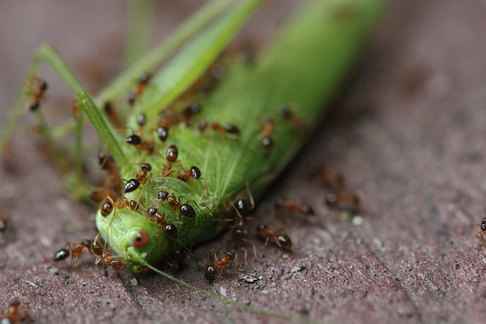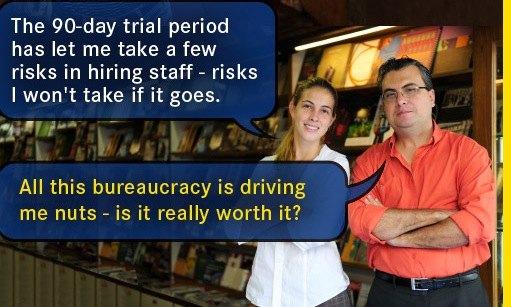This is stupid, slightly racist and reads as “welfare recipients are lazy”, but I’ll play along.
Old Version
The ant works hard in the withering heat all summer long, building his house and laying up supplies for the winter.
The grasshopper thinks the ant is a fool and laughs and dances and plays the summer away.
Come winter, the ant is warm and well fed.
The grasshopper has no food or shelter, so he dies out in the cold.

Modern Version
The ant works hard in the withering heat and the rain all summer long, building his house and laying up supplies for the winter.
The grasshopper admires the ant’s work ethic and would like to be like a hard-working ant, but unemployment is at 6.6% and at least three out of 50 people, including himself, can’t find jobs. If unemployment gets below 5%, the wasps who own the factories start to panic. If the wasps had to compete for employees, instead of the employees competing for jobs, the wasps would have to either raise their prices or keep less of the profits they earn from the labor.
There are more ants than grasshoppers, and ants are usually better qualified, because their parents got them access to better schools and healthcare. Some ants went to private schools and when they got sick outside of business hours, there was no hesitation in taking them to an after-hours surgery. Because their parents valued their education, they were encouraged to work hard at school and many ended up going to university. Because the ants have better qualifications, the grasshoppers are the last to get hired and the first to be fired.
Come winter, the shivering grasshopper calls a press conference and demands to know why the ant should be allowed to be warm and well fed while others are cold and starving.
One News, 3 News, PRIME News, and Campbell Live show up to provide pictures of the shivering grasshopper next to a video of the ant in his comfortable home with a table filled with food.
The country is stunned by the sharp contrast!
How can this be, that in a country of such wealth, this poor grasshopper is allowed to suffer so?
Sue Bradford appears on Campbell Live with the grasshopper–and everybody cries. The Green Party stages a demonstration in front of the ant’s house where the news stations film the group singing, “We Shall Overcome”. The Green Party leader Metiria Turei condemns the ant and blames John Key, Rob Muldoon, Roger Douglas, capitalism and global warming for the grasshopper’s plight.
Many people on radio, TV, in newspapers and on the internet complain that grasshoppers are lazy and should just get jobs. Michael Laws says something about sterilizing all of them so they can’t have kids. He also says something about taking a shotgun to Sue Bradford and members of the Green Party.
John Minto exclaims in an interview with TV News that the ant has gotten rich off the back of the grasshopper, and both call for an immediate tax hike on the ant to make him pay his fair share.
John further explains that the wasps are avoiding taxes by moving their money offshore, exploiting tax loopholes, and ensuring that the bureaucrats appointed to regulate their industries are their friends. He claims that last year the government found $1.7 billion to bail out the well-off shareholders of South Canterbury Finance, but didn’t want to spend $500 million to pay the minimum wage to caregivers staying the night looking after disabled people. He says that a social safety net pays dividends in the form of lower law enforcement and penal system expenses. He is immediately attacked as engaging in “class warfare”.
Finally, to gain votes to win the election, the government drafts the “Economic Equity and Anti-Ant Act”, retroactive to the beginning of the summer. The ant is fined for failing to hire a proportionate number of green bugs and, having nothing left to pay his retroactive taxes, his home is confiscated by the government.
Eventually, the grasshopper does in fact manage to find a job, working in the same factory as the ant now does. In fact, the factory started to hire lots of grasshoppers, since they would work more cheaply than the ants, the low wage still being a huge improvement over the welfare cheque that had previously enabled his “carefree” life.
This had unexpected consequences for the ant. One day, the factory foreman came up to him. “I’m sorry, Mr. Ant,” he said, trying to avoid eye contact. “I’m going to have to let you go.” Not long after losing his job, the ant became ill, he’d contracted cancer through exposure at his job. Because of deregulation and tort reform, the ant had no legal recourse.
Unfortunately, his health insurance had lapsed after he lost his job. While on a waiting list, he was last seen hanging out in an alley, filthy and wearing a “will work for food” sign.
This was eventually the fate of the grasshopper as well. One day the wasp who owned the factory decided that he could make even more money by closing the factory and opening a new one overseas, in a developing country, where the grasshoppers will work for even less money and the government environmental and safety regulations are even less “burdensome”. And the wasp lived happily ever after.
The moral of this story? Not everything is as simple as it seems. Also, that analogies with ants and grasshoppers end up being a bit batshit.
Brought to you with the help of Bushknew.
Also, vote smarter this election.
Image credit: Jun-Dai Bates-Kobashigawa



 Conservative Party image
Conservative Party image
 Conservative Party image
Conservative Party image

 ACT Party image
ACT Party image Terrace 139 Creative
Terrace 139 Creative ACT Party image
ACT Party image
 ACT Party image (you’d think they’d actually use a New Zealander)
ACT Party image (you’d think they’d actually use a New Zealander)
